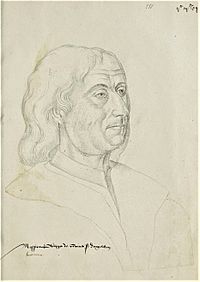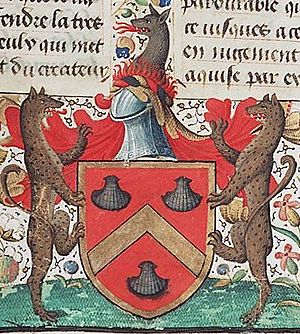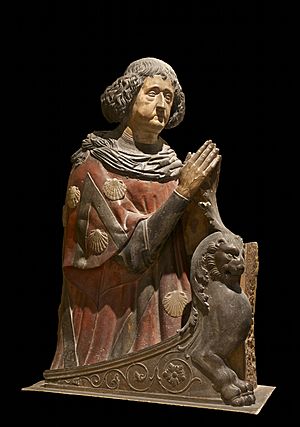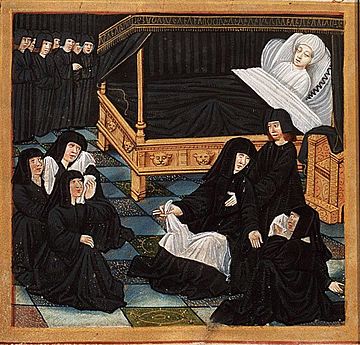Philippe de Commines facts for kids
Quick facts for kids
Philippe de Commynes
|
|
|---|---|
 |
|
| Born | 1447 Renescure, Flanders
|
| Died | c. 1511 Argenton-les-Vallées, Poitou
|
| Occupation | writer, diplomat, politician |
Philippe de Commines (born in 1447 and died around 1511) was an important writer and diplomat. He worked for the powerful rulers of Burgundy and France. Many people consider him one of the first "modern" writers because of how he looked at politics. Instead of just writing down events, he thought deeply about why things happened. He was known for his smart and thoughtful ideas about the political world of his time.
Contents
Biography
Early life and beginnings
Philippe de Commines was born in a place called Renescure, which was part of Flanders back then. His family seemed wealthy, but when his father died in 1453, Philippe inherited a lot of debt.
When he was a teenager, he was taken care of by Philip the Good, who was the Duke of Burgundy and also Philippe's godfather. Philippe fought in some battles, like the Battle of Montlhéry in 1465.
Working for the Duke of Burgundy
In 1468, Philippe became a knight in the household of Charles the Bold. Charles was Philip the Good's son and became Duke in 1467. This meant Philippe was now part of the most important groups and was involved in many big decisions and historical events.
One key moment for Philippe was a meeting between Duke Charles and Louis XI of France in October 1468. It seems that Louis XI believed Philippe had saved his life during this meeting. This might explain why Louis later wanted Philippe to leave Burgundy and work for him.
Philippe also traveled as a diplomat. He was sent to Calais, which was controlled by England at the time. He learned a lot about English politics by meeting with people who had been exiled from England. He even met King Edward IV of England and wrote about what he looked like and his personality. Philippe also wrote about other important figures like William Hastings.
Philippe was a favorite of Duke Charles for about seven years. However, he eventually decided to leave the Duke's service.
Joining King Louis XI of France
Philippe left Burgundy secretly in August 1472 and joined King Louis XI of France. When Duke Charles found out, he took all of Philippe's property.
However, King Louis XI was very generous to Philippe. In 1473, Louis arranged for Philippe to marry Hélène de Chambes, who was a wealthy heiress. Through this marriage and other gifts from the King, Philippe gained many new lands and properties.
King Louis XI valued Philippe because he knew a lot of inside information about Burgundy, which was an enemy of France. Philippe quickly became one of the King's most trusted advisors. The years up to 1477 were very good for Philippe, and he had the King's full trust.
After Charles the Bold died in 1477, Philippe and King Louis sometimes disagreed on how to handle political situations. Philippe also admitted to being friends with some of the King's opponents. After this, much of Philippe's diplomatic work was in Italy, where he met important figures like Lorenzo de Medici.
When King Louis XI became ill, Philippe was welcomed back and helped the King personally. He often worked secretly, almost like an undercover agent. However, he never got back the same close relationship he had with the King before. When Louis XI died in 1483, Philippe was still quite young, and he didn't have many friends left at court.
He stayed on the royal council until 1485. Then, he was involved in a rebellion and was taken prisoner. He was held for over two years, from January 1487 to March 1489.
Writing his Mémoires
After he was released, Philippe was sent to his estate at Dreux. This is where he started writing his famous book, the Mémoires. (This name wasn't used until a later edition in 1552.)
By 1490, he started to regain his position at court and worked for King Charles VIII of France. However, King Charles never gave him the same special position he had with Louis XI. Philippe was again sent as a diplomat to the Italian states. His personal finances were still a bit difficult, and his right to some of the lands given by Louis XI was challenged in court.
Philippe finished his Mémoires in 1498. The book was first published in 1524. It is considered a very important historical record. This is because Philippe wrote honestly about the events and political tricks he had seen. He revealed many of the less pleasant parts of King Louis XI's rule. However, Philippe believed that the King's good qualities were more important than his bad ones. His writings are a major source of information for understanding 15th-century European history.
The Mémoires are divided into "books." The first six books were written between 1488 and 1494. They cover events from the start of Philippe's career in 1464 up to the death of King Louis XI. The last two books were written between 1497 and 1501. They talk about the Italian wars and end with the death of King Charles VIII of France.
Philippe de Commines was known for his realistic and sometimes cynical view of politics. He once wrote, Car ceux qui gagnent en ont toujours l'honneur which means "For the honors always go to the winners." He never tried to make himself look like a hero, even when writing about his time as a soldier.
His approach to politics was very practical and forward-thinking. His thoughts on the events he witnessed were much deeper than those of earlier writers like Jean Froissart. He had a good understanding of how kings thought and acted, which was very advanced for his time. In some ways, his ideas were similar to those of Niccolò Machiavelli, another famous political writer. Like Machiavelli, Philippe wanted to teach readers about how to govern a country. He especially noted how King Louis XI often outsmarted the English, not by fighting, but by clever political moves.
See also
 In Spanish: Philippe de Commines para niños
In Spanish: Philippe de Commines para niños
 | Leon Lynch |
 | Milton P. Webster |
 | Ferdinand Smith |




